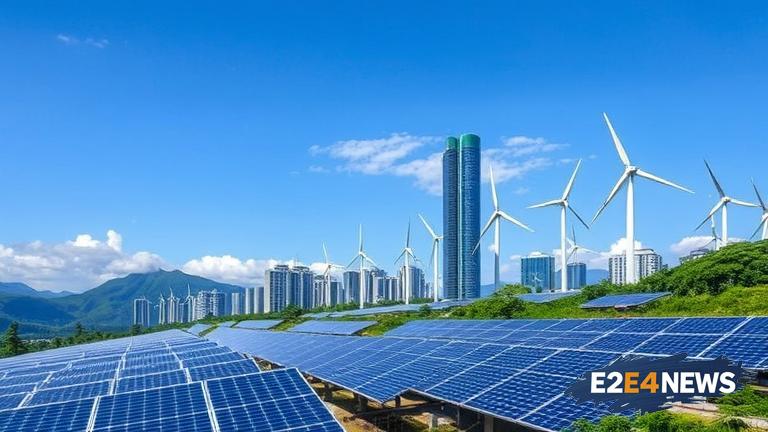Taiwan has been actively promoting renewable energy sources in recent years, with a focus on reducing its reliance on fossil fuels and mitigating the impacts of climate change. The government has set ambitious targets to increase the share of renewable energy in the country’s energy mix, with a goal of reaching 20% by 2025. To achieve this, Taiwan has been investing heavily in solar and wind power, with numerous large-scale projects underway across the island. The Taiwan Strait has been identified as a prime location for offshore wind farms, with several major projects already in development. The government has also implemented policies to encourage the adoption of renewable energy sources, including feed-in tariffs and tax incentives for businesses and individuals. Additionally, Taiwan has been promoting energy efficiency and conservation, with initiatives such as smart grids and green building certification programs. The country has also been actively engaged in international cooperation on climate change, participating in global forums and agreements such as the Paris Agreement. Despite these efforts, Taiwan still faces significant challenges in its transition to a low-carbon economy, including the need for significant investment in infrastructure and technology. However, the government remains committed to its goals, and is working to create a favorable business environment for renewable energy companies. The private sector is also playing a key role, with many Taiwanese companies investing in renewable energy projects and technologies. The development of renewable energy in Taiwan is not only good for the environment, but also has the potential to create new job opportunities and stimulate local economies. The government has estimated that the renewable energy industry could create tens of thousands of jobs in the coming years, and generate significant economic benefits. Furthermore, the adoption of renewable energy sources is expected to improve air quality and public health, particularly in urban areas. Taiwan’s renewable energy efforts have also been recognized internationally, with the country receiving praise from global leaders and organizations for its commitment to reducing carbon emissions. The government has also been working to promote public awareness and education on renewable energy and climate change, with initiatives such as school programs and community outreach campaigns. Overall, Taiwan’s push for renewable energy is a key part of its efforts to create a more sustainable and environmentally-friendly future. The country’s progress in this area will be closely watched by the international community, and is expected to have significant implications for the global effort to combat climate change. Taiwan’s experience and expertise in renewable energy could also provide valuable lessons for other countries, particularly in the Asia-Pacific region. As the world continues to grapple with the challenges of climate change, Taiwan’s commitment to renewable energy is a positive step towards a more sustainable future. The country’s renewable energy sector is expected to continue to grow and evolve in the coming years, with new technologies and innovations emerging all the time. The government will need to continue to provide support and incentives for the industry, while also addressing the challenges and obstacles that remain. With its strong commitment to renewable energy, Taiwan is well-placed to become a leader in the global effort to reduce carbon emissions and promote sustainable development.





